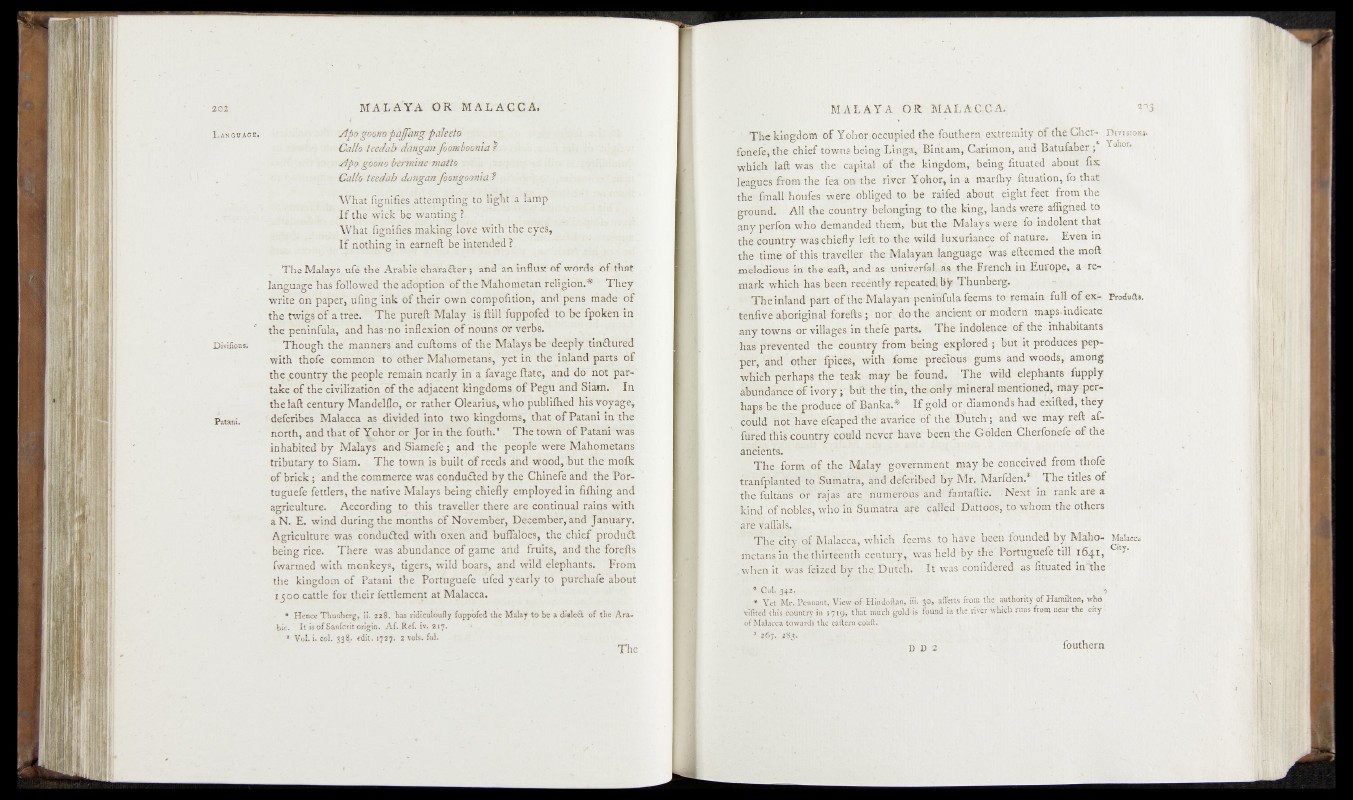
.202
LasI^vagb.
Divifions.
Patani.
MALAYA O R M A L A C C A.
■ ÂpÔ'goôno^paffang fdlceto \ |
Câllo iteedah-dangmi.Jbonibôbma f.
» Jlpo/goqno ■ btrvime mat'to i
l - Callo teedah dangdnybsngmma ?
What lignifies attempting to light a lamp
If the-wick be wanting ?..
What lignifies making" love with the eyefe,r" ’
If nothing in earneft be intended r.
The Malays ufë the Arabfiih^a&éri; and hnlinfllisf ©f*Wbrds of-that
language has followed the atf^fibftYFthe Mahometan,réftgidti.* ’ They
write on paper, uflhgrink ôf „their own ,cornf>t)fitk)û, and pens made’ of
{he twigs o’f a tree. THè pureft Malay is ftill fup.pofed' tt> lbe~fpoken in
the penirifula, and has-no inflexion dfnouns tit verbs-
Though the manners and euftoms of the Malays^be deeply tiiîQiliréd1
with thofe common to other Mahometans, y p iff the inland parts of
the .country the people remain nearly In at favâgê ftate, and' da-' not par-'
take of the civilization of the adjacent kingdoms, of Pegu and Siam. In
the laft century Mandelflo, or rather Oleariüs, who ppbliîhed his voyage*
defcribes Malacca as divided into two hingdoms', .that of Patani in "the
north, and that of Yohbr or Jor in the foüfti.1 The town o¥Patani Was
inhabited by Malays and Siamefe ; and the ’ people "were Mahotaèt^Üs
tributary to Siam. • The town.is built of reeds and wood,'.huone -mofk
of brick ; and the commerce was conducted by the Chinefé and the PorT
tuguefe fettlers, die native Malays being chiefly ëmployëd in fifhing and
agriculture. According to this traveller there are continuai fains with
â N. E. wind during die months of November, December, and January.
Agriculture was conducted with oxen and huflalbep, .die phtéf prod-ua:
being rice. There was abundance of game and fruits, and the forefts
fwarmed with monkeys, tigers, wild boars, and wild elephants. From
the kingdom of Patani the. Pomiguefe ufed yearly to purchafe about
1500 cattle for their fêttlement at Malacca.
■ * Hence Thunbèrg, il. 228. hasridicntoufly ftippofed the Malay to be a dialéft of the Arabic.
It is o f Sanfcrit origin. -Af. Ref. iv. 217. -
I VoL i. col. 338. edit. 1727. 2 vols. fol. ?
The
' M A L A Y A OR MALACCA. . " .
' The kingdom of .Yohof occupied the fouthern extremity of the Cher- , J3*visios«. ■
fonefe,'the chief townsbgkig Lifig$v Biritam, Carjmoq, and Batufaber ; Yollor*
whieb laft was—the capital ■ of the kingdom, being fituqted .about*fix
leagues frfsmvthe fea on-the river Yohor, in a rtiarfhy fistuati&n, fo tha-S
the^ftniall-Jhoufes were-obliged to fee rai&d about eight feet 'from the "
ground. All thereotiatEy betoqgfeag to the king,-lands. wpre_ affigned t6
agSysperfpn who demanded tli'eras, but the Malay shw-ere-^fp* indolent that
the country was;chi efly left, tocthe wild luxuriainee of patyre. -Even in
the time -of this traveller .the Malayan .language was( efte&m,ed the moft
melodious in-the.eaft,and’as.uniyerMi AS ithesErenph in a re" -
mark .which has been recently repeated Thunberg.
' 'The inland5 p£it of-the Malayan- pe-nifSula, feems to- remain ful of ex- produfr.
t-erifiveaboriginal-forefts-;-nbr do-the drafcimt or modern vmaps.indicatd
any towns-or villages' ll* thefe'parts-. The indole nee .Qf.tke inhabitants
plfevented'- the Country from being explored; but. k produces pepper;
*and S other' {pices, with fome precious gums and woods;, among
Which p'erhaps'the' teak may be found. The wrkl elephant's fupply
abtfftdatf^of ivor'ybtfcttfeti-n, thn-only mineral mentioned* may perhaps
be ^,nroducetof Banka* If gbld of diamendshad ekifted, they
cqlM not Have efcaped' the" aVarice *Bf Dutch';* arid we may reft af-
gPni 1 nrry could never have been the Golden GheMpnfefe- of the
anelenfsT' - "'v‘5 ", ’ ’ ■ "t / ’ *
The form nf^tjie Malay government ? may h|.conceiyed from thofe
trahfplanied’to ^uh|a'tra, and defcriBed by Mr. Marfden.* The. titles of
. as 'A'fqyfftinta-oils^nd^fkijrafticr{' »Next in rank are a
kin^ ofpo^lesl w h '^ are tl^^lMl^^fwhom^tH'e others
are vaflal^». -
‘ The qity of Malacca, which ffiem$.„:to'have beenjoundetl by Mafeo- Malacca
Inetans in the"thirteenth century.^was heldhy,t!ie Ppttugu-efe till 164'!, 7
.when iVyvas f^jzed By the.Dutch. 11-was^bhfiderfed as fituated in^he
jjtAGoh 342. | ’ ; j | | l s 2
\m t e t %.4^0nant,;Vkw,of Hindpfbn:, ui. 3<3, afferts from thp. authority of Haipaton, who
W t e j l W >'» 171^, that mucii gold is found in the riveii # i c h runs from near the city
.ofMalacca^towl^||heeallero.coaft.
s i i i i i i i i i ?
D D 2 fouthern